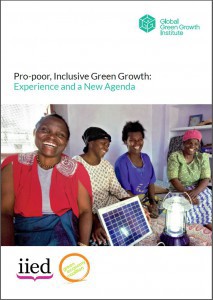Pro-poor, Inclusive Green Growth (GGGI)
Pro-poor, Inclusive Green Growth: Experience and a New Agenda / Global Green Growth Institute (GGGI) / 2016
 This report states that: “for green growth to fulfil its promise” it needs to “address the drivers of poverty and social exclusion”. It argues that green growth policies need to get support from across society to pressure policymakers to act. If “green growth does not deliver benefits to all stakeholders it will not lead to the kind of transformative change envisioned by the global community and outlined in the Sustainable Development Goals“.
This report states that: “for green growth to fulfil its promise” it needs to “address the drivers of poverty and social exclusion”. It argues that green growth policies need to get support from across society to pressure policymakers to act. If “green growth does not deliver benefits to all stakeholders it will not lead to the kind of transformative change envisioned by the global community and outlined in the Sustainable Development Goals“.
The report notes that in middle and low-income countries the poor and excluded “have been failed by the current economic system” and in some countries can sometimes represent over half of the population. “Therefore inclusive green growth is not merely a question of bringing in small marginal groups”. It is about “reshaping the economy to make better and more sustainable use of the environment to meet society’s needs more broadly”.
The report highlights that often the poorest (e.g. small or informal businesses) are not able to influence policy and business outcomes because they lack power. The report notes that: “this is of critical importance because the informal economy is much larger than the formal economy in many developing countries, and the starting point for most poor groups”. And that “therefore, if the benefits of green growth are to be shared and take hold at scale, these often excluded stakeholders need to ‘own’ and participate in inclusive green growth that is specific to their own experiences”. Otherwise the risk is that green growth is “viewed as an external imposition” and “green economies become “owned” by a few, with escalating social tensions”.
The report includes several case studies including:
- The removal of the fossil fuel subsidy in Indonesia which was accompanied by social welfare policies
- Sharing ecotourism revenue in Rwanda with local communities to conserve biodiversity
- Using indigenous models of equity and environmental limits in Peru. “Fostering such development models offers a pathway for achieving inclusive green growth in rural areas, which is likely to have greater legitimacy and support for implementation than external concepts”.
The report makes recommendations in four policy areas:
- Governance: Institutions should be inclusive, integrated and transformative
- Empowerment: The livelihoods, rights and capital assets of poor men and women should be strengthened. A participatory transition process owned by excluded and poor women and men themselves. Green growth technologies screened and promoted for how they benefit poor and excluded women and men.
- Inclusive finance mechanisms: Green options should be accessible to small and informal business. Microfinance, local funds and social protection schemes provide instruments for finance to reach those who need it most. Natural resource revenues are carefully managed to benefit the poor and sustain future flows — bringing about a resource “blessing” rather than a resource “curse”.
- Metrics for inclusive green growth: Aligning multiple sustainable development (SD) with green growth (GG) metrics
Read report
This report was published in association with the International Institute for Environment and Development (IIED) and the Green Economy Coalition.
See also: Implementing the Paris Agreement: Our Service Offerings
————————————
This summary was prepared by Why Green Economy?. The views expressed have been paraphrased. See the original source for more information.

Leave a Reply